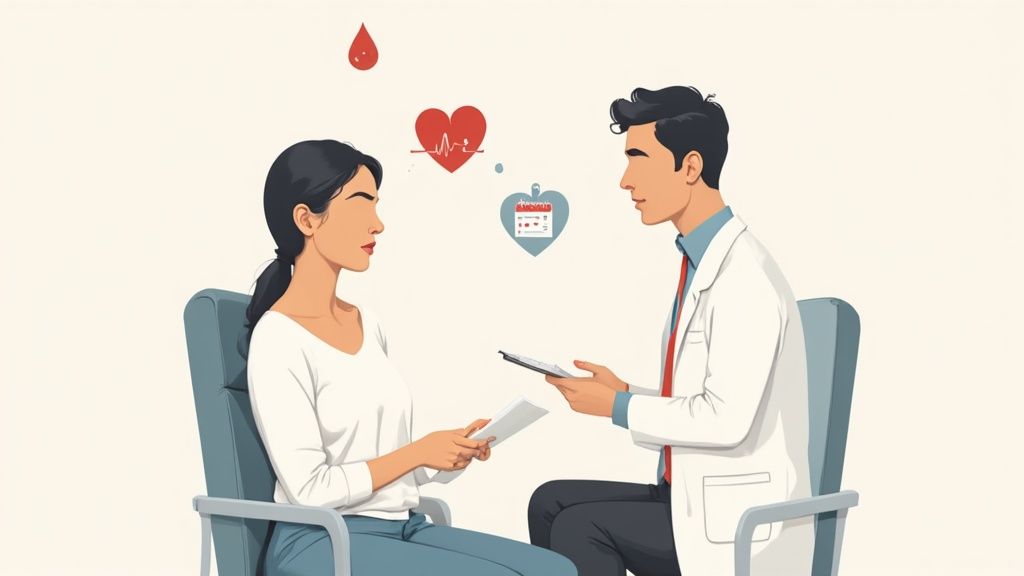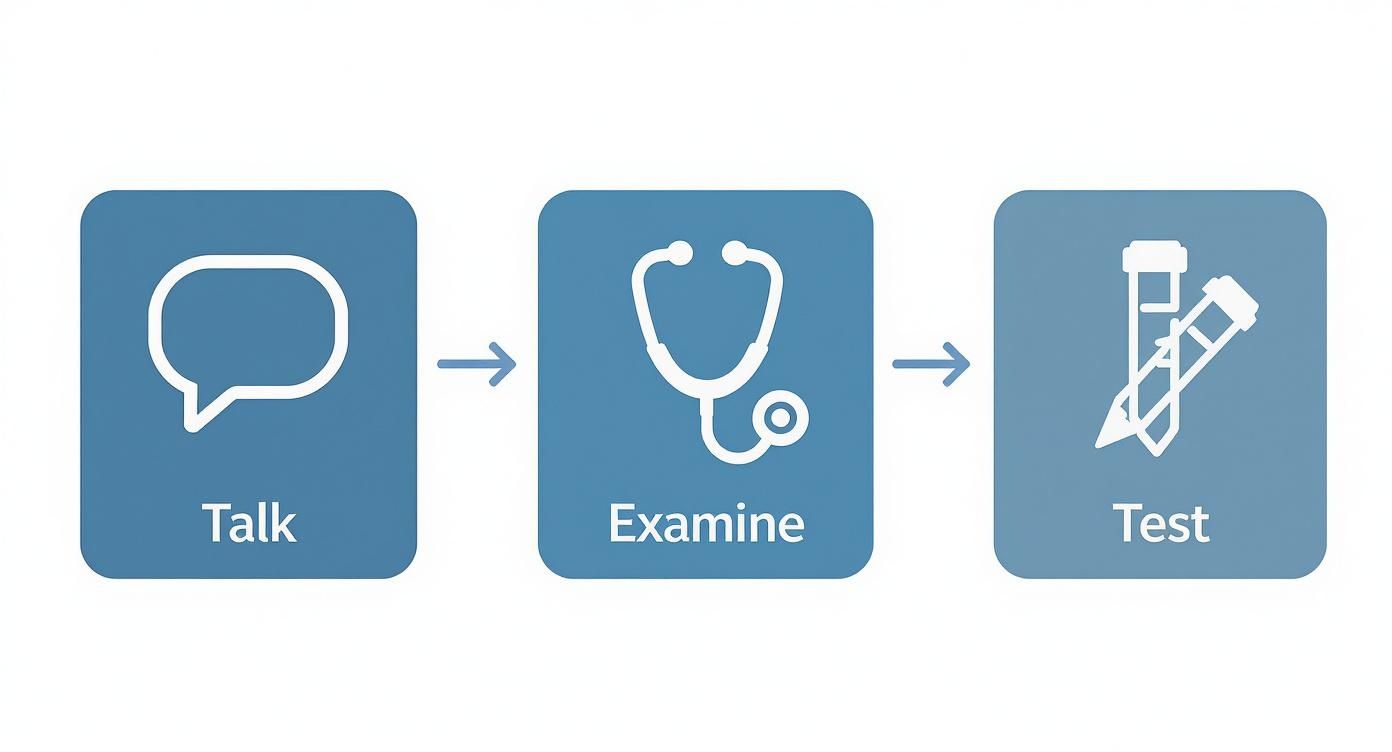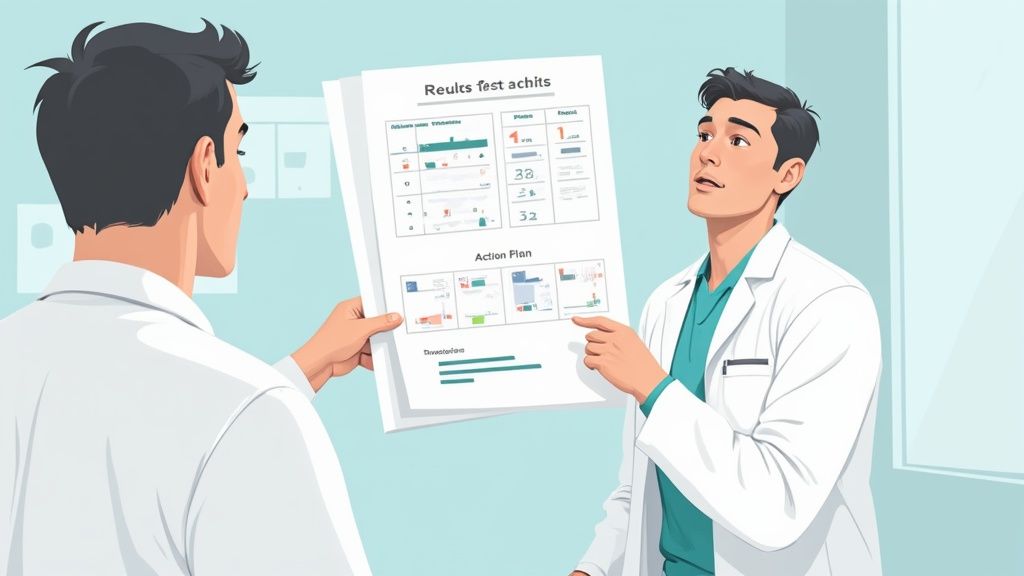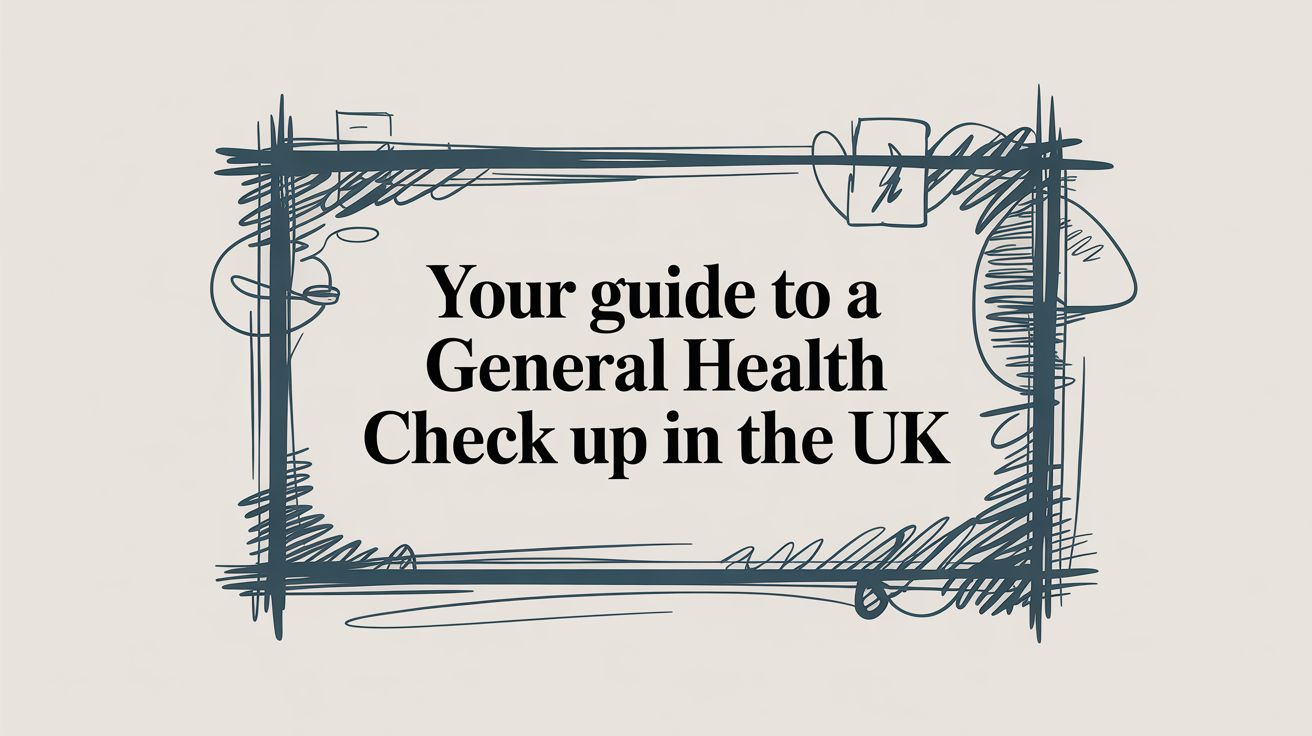.webp)
A general health check-up is basically a full review of your overall wellbeing. It’s a series of medical tests and physical examinations designed to spot potential health issues early on, long before you might even notice any symptoms.
Think of it as a routine MOT for your body. It’s a chance to look under the bonnet, check the engine is running smoothly, and make sure everything is in good working order. It really is the cornerstone of smart, preventive healthcare.

Most of us only think about seeing a doctor when we're already feeling unwell. We tend to view healthcare as a reaction to a problem that’s already surfaced. A general health check up completely flips that script.
Instead of just treating illness, it shifts the focus to proactively managing your health for the long haul. It’s all about getting ahead of potential problems before they become serious.
This preventive approach is about catching the subtle warning signs your body might be sending. Things like high blood pressure, rising cholesterol, or the early stages of diabetes often creep up silently, with no obvious symptoms at all. A routine check-up can spot these issues when they are at their most manageable.
The main point of a health screening isn't just to find out what's wrong. It’s also about confirming what's right and identifying small changes you could make for big improvements down the line. It's a team effort between you and your doctor, establishing a clear baseline of your health that you can both monitor over time.
The key objectives really boil down to a few simple things:
A check-up is more than just a list of tests; it's a strategic conversation about your future wellbeing. It gives you the data you need to make informed decisions, putting you firmly in the driver's seat of your own health journey.
These appointments are the foundation of a solid health strategy. They allow your doctor to build a detailed profile of your health, making it much easier to notice any changes or trends as the years go by. To get a feel for the full scope of these examinations, it’s worth learning what is comprehensive health screening and all the different components that can be involved.
Ultimately, investing in a regular general health check up is one of the most powerful things you can do for your long-term vitality. Many people find a detailed assessment like a well person check gives them the complete overview they’re looking for. It isn’t an expense; it’s an investment in your most valuable asset—your future self. By being proactive, you empower yourself to live a longer, healthier, and more vibrant life.
When it comes to getting a general health check up in the United Kingdom, you’ve got two main avenues: the NHS and the private sector. Knowing the lay of the land between these two options is the first step in figuring out what’s right for you and your health goals.
The most familiar route for many is the NHS Health Check. This government-backed programme is a key part of the UK's preventive health strategy, built specifically to catch the early warning signs of major issues like heart disease, diabetes, kidney disease, and stroke. It’s a targeted screening, and for good reason.
But it’s not open to everyone.
The NHS Health Check is offered completely free of charge to those who are eligible. It’s a systematic way of identifying the biggest risk factors for some of the most common long-term health problems we face.
The eligibility criteria are quite strict:
If you tick these boxes, you can expect an invitation from your GP surgery or local authority about once every five years. The check itself is straightforward, involving a few simple tests and a chat about your lifestyle and family medical history to get a clear picture of your cardiovascular risk.
While the NHS provides a crucial service, many people choose to go a step further with private health screenings. This path offers a completely different level of detail, personalisation, and convenience, which is a huge draw for anyone wanting a more granular view of their wellbeing.
People go private for all sorts of reasons. Often, they’re looking for more extensive tests that dig deeper than the cardiovascular focus of the NHS check. Think detailed cancer marker tests, vitamin deficiency analysis, or advanced hormonal profiling. For others, it’s about speed and flexibility—booking an appointment quickly and at a time that works around a packed schedule. For a deeper dive, you can learn more about the benefits of a private health screening in the UK and what these comprehensive assessments involve.
The real game-changer with the private route is tailoring the assessment to your specific concerns. If you have a family history of a certain condition or just want a comprehensive baseline of your health, a private screening can be built around that.
It's clear there's a growing appetite for proactive health management. The UK's health check-up market was valued at a huge £2.11 billion in 2023 and is expected to rocket to £3.19 billion by 2032. This surge is powered by public health initiatives and the booming private sector, with corporate wellness programmes also playing a big part. You can discover more insights about the UK health check up market trends on archivemarketresearch.com.
So, which path is the right one? It’s not always a case of choosing one over the other; many people use both services at different points in their lives. The trick is to understand what each one brings to the table.
At the end of the day, the NHS Health Check provides an essential, free safety net for a specific group of people, effectively targeting major public health threats. Private screenings, on the other hand, offer a more personalised, in-depth, and flexible alternative for those who want to take a more hands-on and detailed approach to their long-term health.
Walking into a general health check-up can feel a bit mysterious, especially if it’s your first one. Knowing the typical flow of the appointment can help ease any nerves and empower you to get the most out of your time with the doctor. Think of it not as a test, but as a collaborative conversation designed to give you a clear snapshot of your current wellbeing.
The whole process usually unfolds in three core stages: the initial chat, the physical examination, and then any necessary tests. Each part plays a vital role in building a complete picture of your health.
This simple flow chart illustrates the key steps of your appointment, from conversation to examination and testing.
This structured approach ensures that every aspect of your health, from your personal history to your current physical state, is thoroughly reviewed.
Your appointment will almost always begin with a detailed conversation. This isn't just small talk; it's a crucial information-gathering session for your doctor. They need to understand the full context of your health, not just the numbers from a blood pressure cuff.
You'll be asked about several key areas:
Think of this part of the check-up as setting the scene for a story—your health story. The more details you provide, the clearer the plot becomes for your doctor, allowing them to connect the dots effectively.
Once your doctor has a good handle on your background, the next step is the physical examination. This is a hands-on assessment to check how your body’s core systems are functioning. It’s usually quick, painless, and provides immediate, valuable data.
During this stage, your doctor will typically perform several standard checks:
This physical assessment provides a vital baseline. For instance, a single high blood pressure reading isn't necessarily a cause for alarm, but it tells your doctor it's an area worth monitoring over time. It’s all about building a trend map of your health.
The final part of a general health check-up often involves diagnostic tests, and the most common of these is a blood test. This is where the appointment moves from external observation to an internal analysis of what’s happening inside your body. It's incredible what a small sample of blood can reveal.
These tests are designed to screen for common issues that may not yet show any outward symptoms, helping to flag potential problems at their earliest, most treatable stage.
To give you a better idea, here's a look at some of the standard tests you might encounter.
Common Tests in a General Health Check Up
These screenings are fundamental to preventive medicine. You can learn more about the crucial role of blood testing in modern healthcare and how it helps doctors detect issues long before they become serious. By combining your personal history, a physical exam, and these internal tests, your doctor gets a well-rounded and accurate view of your overall health.
To get the most out of your general health check up, a little bit of prep work can make a world of difference. It’s what turns the appointment from a passive experience into a really productive, collaborative chat about your wellbeing.
Taking a few simple steps beforehand means you and your doctor are on the same page from the moment you walk in. This isn't just about the practical stuff; it’s about getting into the right mindset. By thinking through your health concerns and goals ahead of time, you arrive ready to talk, ensuring no important questions get missed.
Before you even leave the house, there are a few practical things to get sorted. Nailing these details helps the appointment run smoothly and makes sure any tests are as accurate as they can be.
Confirm Fasting Requirements: Many blood tests, especially for cholesterol and blood glucose, need you to fast for 8-12 hours beforehand. This means absolutely nothing to eat or drink except for water. Always double-check with the clinic when you book to see if this applies to your appointment.
Gather Your Information: Don't try to rely on memory. Jot down a clear list of all the medications you're taking—that includes vitamins, supplements, and any over-the-counter medicines. Make a note of the dosages and how often you take them.
Wear Appropriate Clothing: Think loose and comfortable. A short-sleeved top, for instance, makes it much easier for the nurse or doctor to take your blood pressure or draw a blood sample without you needing to get changed.
Beyond the practicalities, preparing mentally is probably the most crucial step you can take. Your doctor can only help with the concerns you bring to them, so taking a moment to reflect on your health is key.
Start by making a few notes about how you've been feeling lately. Think about any new or nagging symptoms, even if they seem minor. Have you noticed any changes in your sleep, energy levels, digestion, or mood? No detail is too small when you're building a complete picture of your health.
Your general health check up is your dedicated time to ask questions. Treat it as an opportunity to tap into expert medical advice tailored specifically to you. A prepared patient is an empowered patient.
Having a list of questions ready ensures you cover all your bases and walk out of the appointment feeling informed and confident. You don't need dozens—just a few that really matter to you.
Here are a few ideas to get you started:
By putting in this little bit of prep work, you become a true partner in your own healthcare, making sure your appointment is as valuable and effective as it can be.

Once your general health check up is done and the tests are complete, the final step is getting your results. For many, this feels like the most nerve-wracking part, but it’s actually the most empowering. This is the moment where raw data is translated into a clear, actionable health plan made just for you.
Your doctor will sit down with you to go through everything, explaining what each number means in the context of your overall health. Think of it less like a pass-or-fail exam and more like being handed a personalised roadmap. It shows you exactly where you are today and points out the best routes toward a healthier future.
One of the first things you'll see on your report is the concept of a 'normal range'. For every test, whether it’s blood pressure or cholesterol, there’s a set of values considered healthy for the general population. A classic example is blood pressure, where a ‘normal’ reading is typically around 120/80 mmHg.
It's vital to remember that these are just guidelines. Your personal 'normal' might look a little different depending on your age, gender, and unique medical history. What your doctor is really interested in is your individual numbers and what they signal about your health.
A result that falls outside the standard range isn't automatically a reason to panic. It’s simply a flag—an indicator that prompts a deeper conversation with your doctor about what that number means for you and what should happen next.
This personalised approach is far more meaningful than just comparing you to a generic chart. To get a better grasp of how these diagnostics work, it’s worth understanding the crucial role of blood testing in preventive healthcare, as this provides valuable context on how doctors interpret these figures. You can read more about it here: https://www.thevesey.co.uk/blog/blood-testing-the-unsung-hero-of-preventive-healthcare
After reviewing your results, your doctor will map out what comes next. The outcome of your general health check up usually falls into one of a few categories, each with a clear path forward.
A Clean Bill of Health: If all your results are in a healthy range for you, that’s brilliant news! Your doctor will likely encourage you to keep up your current lifestyle habits and book your next check-up based on their recommended timeline.
Lifestyle Recommendations: It’s common for results to highlight an area that needs a bit of attention. Your doctor might suggest specific, practical changes to your diet or exercise routine to help lower your cholesterol or manage your weight.
Starting a New Medication: For some conditions, like high blood pressure or diabetes, lifestyle tweaks alone might not be enough. If that’s the case, your doctor might prescribe medication to help manage the issue and lower your long-term health risks.
Referral to a Specialist: If a result points to a more specific or complex issue, you may be referred to a specialist. This could be a cardiologist for a heart concern or an endocrinologist for a hormone-related problem, ensuring you get the right expert care.
The real value of a health check-up is what you do with the information afterwards. Your results are a powerful starting point for making informed decisions about your wellbeing. Whether the advice is to eat more greens, start a new medication, or see a specialist, following through is what makes all the difference.
This proactive approach to health is also becoming more accessible. As you review your results, it can be helpful to know about different testing methods, including at-home options. For a breakdown of popular services, you can consult an expert guide to at-home health testing.
Ultimately, your results aren't a final verdict; they're a dynamic tool. They give you the clarity and direction needed to take control of your health journey, turning insights from your check-up into lasting, positive change.
Even after digging into the what, why, and how of a general health check up, it's completely normal to have a few questions left. This stuff is personal, and you should feel 100% clear and confident before booking anything. Think of this as a quick FAQ to tackle the most common queries we hear.
We've pulled together the questions that pop up most often, with straightforward answers to help you feel fully informed. From how often you should get checked to whether it's even worth it when you feel fine, we'll cover the practical details.
This is the big one, and there's no single answer that fits everyone. The right schedule for a general health check up really comes down to your age, your personal health history, and any risk factors you might have.
In England, the NHS has a clear guideline. If you're aged between 40 and 74, you'll be invited for a free NHS Health Check every five years. This schedule is specifically designed to screen for the biggest cardiovascular risks in that age group.
But your own situation might call for a different rhythm.
It's a common thought: "If it isn't broken, don't fix it." That might work for a washing machine, but it’s a risky way to approach your health. The short answer is yes, check-ups are vital—perhaps especially when you feel fine.
The whole point of a general health check up is to spot trouble before you feel it. Many of the most serious long-term conditions creep up silently, with zero symptoms in the early days.
Think of it like a smoke detector. You don’t wait for a fire to start before you install one. A health check-up works on the same principle of early warning, giving you the chance to act long before it becomes an emergency.
Things like high blood pressure (often called "the silent killer"), high cholesterol, and the first stages of type 2 diabetes can go unnoticed for years. By the time symptoms show up, the condition may have already done some damage. A routine check-up can catch these subtle red flags early, when they're far easier to manage, treat, or even reverse with lifestyle changes. To really grasp this, it helps to understand the growing importance of preventative care in modern medicine.
While both are there to protect your health, NHS and private check-ups have slightly different aims and suit different needs. Knowing the difference helps you pick the right path for you.
The NHS Health Check is a brilliant, free public health programme. It's a standardised screening with a very specific goal: to assess your risk of developing heart disease, stroke, diabetes, and kidney disease. It’s targeted at a specific age group (40-74) to tackle the most common threats for that population.
A private health check up is a paid service that offers much more depth and personalisation.
In a nutshell, the NHS check is a vital safety net for your cardiovascular health, while a private screening is a more detailed, customisable MOT for your whole body.
The cost of a private general health check up can vary quite a bit, so it helps to know what to look for. The price depends on the provider you choose and, crucially, how many tests are included in the package.
Here’s a rough guide to what you can expect:
When you're comparing prices, always check the list of included tests. It's the only way to make a fair comparison and choose a package that really matches what you want to achieve.
At The Vesey, we believe proactive health management is the foundation of a long and vibrant life. Our comprehensive health check-ups are designed to give you a clear, detailed picture of your wellbeing, empowering you to take control of your future. To learn more about our personalised health screening packages, visit us at https://www.thevesey.co.uk.

Book your Health Assessment today
